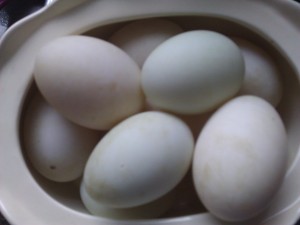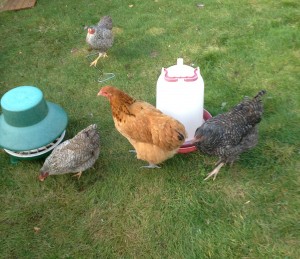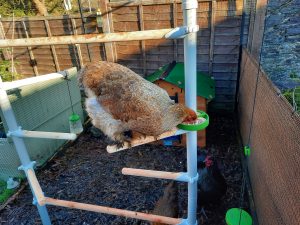Have you ever had the experience of eagerly anticipating collecting eggs from your chickens only to be disappointed when you open the nesting box and find nothing? It’s a common problem for chicken owners, but don’t despair – there are many troubleshooting tips you can employ to get your chickens back on track. Our girls seem to be on an extended egg laying break this Winter, normally I’d have expected one or two eggs a day by now.
With a little detective work and some patience, you can usually figure out why your chickens have stopped laying eggs and get them back to their normal routine in no time. From environmental changes to dietary considerations, I’ll discuss a few common troubleshooting tips to help get your – and my! – chickens back to laying eggs.
 What are common causes of chickens not laying eggs?
What are common causes of chickens not laying eggs?
When chickens stop laying eggs, it could be for a variety of reasons, ranging from environmental issues to health concerns. It’s important to determine what might be causing the problem so that you can take the appropriate steps to get your chickens back to laying eggs.
The first thing to consider is the age of your chickens. Chickens typically start laying eggs at around 18-24 weeks old, but they may slow down or stop laying eggs as they get older. If your chickens are past the prime age for egg-laying, it could be the reason why they’ve stopped producing. Pure breeds will continue egg laying for longer than hybrids, although their weekly production will be lower over the years.
Another common cause is the environment. If your chickens are not getting enough light, they may stop laying eggs. Chickens require 14-16 hours of light each day in order to produce eggs, which is why their natural production ramps up in the Spring. If your chickens are not getting enough light, try increasing the amount of daylight they receive or you can consider adding artificial lighting to get them back on track.
Diet can also be a factor. If your chickens aren’t receiving the necessary nutrients, they may stop producing eggs. It’s important to ensure that your chickens have a balanced diet with plenty of protein, calcium, and other essential vitamins and minerals.
Finally, health concerns can cause your chickens to stop laying eggs. Anything from parasites to infections could be the culprit, so it’s important to check your chickens for any signs of illness.
Environmental factors to consider
The environment can have a huge effect on your chickens’ egg production, so it’s important to consider any environmental changes that might be causing them to stop laying eggs.
First, check the temperature. If the temperature is too hot or too cold, it could be the cause of your chickens’ lack of egg production. This is why in the heat of the Summer you can have egg laying lulls.
Next, consider the humidity. If the humidity is too high, it can cause your chickens to become stressed and stop laying eggs. Try to keep the humidity between 40-60 percent, although this is more of a problem if the flock is fully housed – free ranging hens won’t usually suffer from this problem. At the moment in the UK all poultry has to be housed, so keeping an eye on your humidity is a good idea.
Finally, as mentioned above, pay attention to the amount of sunlight your chickens are receiving. If fully housed for Avian Flu protection make sure there is natural light coming into the house or run, if this isn’t possible or the run/house is still low natural you will want to add in artificial lighting.
 Dietary tips for increasing egg production
Dietary tips for increasing egg production
In addition to environmental factors, diet can be a major factor in egg production. If your chickens are not getting the necessary nutrients, they may stop producing eggs. Here are a few tips for ensuring your chickens have a balanced diet:
First, make sure your chickens are getting plenty of protein. Protein is essential for egg production, so it’s important to make sure your chickens are getting enough in their diet. A good quality layers pellet should provided all their protein needs. You can add supplements such as mealworms and other insects to their diet to provide additional protein.
Second, provide your chickens with plenty of calcium. Calcium is essential for egg production, and it’s important to make sure your chickens are getting enough of it in their diet. Adding crushed oyster shells or other calcium supplements to their feed can help ensure they’re getting enough.
Finally, provide your chickens with plenty of fresh vegetables. Vegetables provide essential vitamins and minerals that can help keep your chickens healthy and productive. Try adding a variety of vegetables such as lettuce, spinach, and carrots to their diet to ensure they’re receiving all the nutrients they need.
How to check your chickens for health issues
If the environmental and dietary factors have been ruled out, it’s important to check your chickens for any signs of illness. Parasites, infections, and other health issues could be the cause of your chickens’ lack of egg production. Here are a few tips for checking your chickens for health issues:
First, check for any signs of parasites. Parasites can cause your chickens to become sick and stop laying eggs. Look for any signs of mites, lice, or other parasites on your chickens’ feathers and skin.
Second, check your chickens’ droppings. If your chickens’ droppings are runny or contain blood, it could again be a sign of an infection or other health issue.
Finally, check your chickens’ combs and wattles. If your chickens’ combs and wattles are pale or discolored, it could be a sign of a health issue.
We have a whole section on Poultry Illnesses & Ailments, but please make sure to take your chickens to the vet if you notice any serious ill health.
Checking your coop for potential problems
In addition to checking your chickens for health issues, it’s important to make sure your coop is in good condition. A poorly maintained coop can cause your chickens to become stressed and stop laying eggs. Here are a few tips for checking your coop for potential problems:
First, check for drafts. Drafts can cause your chickens to become cold and uncomfortable, which can lead to decreased egg production. Make sure to seal any cracks or openings in the walls of your coop to keep the cold air out. However, you need to make sure all ventilation holes are clear – do not block ventilation in the coop when removing drafts!
Second, check for pests. Pests such as rats and mice can cause your chickens to become stressed, which can lead to decreased egg production. Make sure to plug any holes or cracks in the walls of your coop and run to keep pests out.
Finally, check for any potential hazards. Anything from sharp objects to toxic chemicals can cause your chickens to become stressed, so it’s important to make sure your coop is free of any potential hazards.
How to ensure your chickens have enough space
Crowded coops can cause your chickens to become stressed, which can lead to decreased egg production. It’s important to make sure your chickens have enough space in their coop to move around comfortably. Here are a few tips for ensuring your chickens have enough space:
First, make sure your chickens have enough nesting boxes. Ideally you want one nest box per 2 hens – make sure you have enough for all of your chickens.
Second, make sure your chickens have enough roosting space. Roosts provide your chickens with a place to sleep in a natural way, so it’s important to make sure they have enough space to do so comfortably.
Finally, make sure your chickens have enough space to move around. If your chickens are overcrowded, it can cause them to become stressed and stop laying eggs. Make sure you have enough space in your coop are run for your chickens to move around comfortably. I know a lot of people have struggled with space due to the current housing orders in the UK. Raised chicken coops such as the Omlet Eglu allow for extra run space under the coop itself – a boon for those of us with small poultry runs.
 Stress management tips
Stress management tips
Stress can be a factor in egg production, so it’s important to make sure your chickens are not too stressed out. Here are a few tips for managing stress in your chickens:
If your flock has plenty of light, space, and a good well balanced feed then you’ve already tackled most of the “stress” factors for a flock.
One additional thing you can do is provide your chickens with plenty of stimulation. Bored chickens can become stressed, so it’s important to provide your chickens with plenty of toys and other stimulating activities to keep them occupied. We have a large planter filled with a soil/sand combo for dust bathing as well as the Omlet Pole Tree within the run to give the girls plenty of perching space and hentertainment.
Getting your chickens back to laying eggs can be a challenge, but with a little detective work and some patience, you can usually figure out why your chickens have stopped laying eggs and get them back to their normal routine in no time.



Leave a Comment Here on The Girls are Slacking – Still Very Few Eggs!